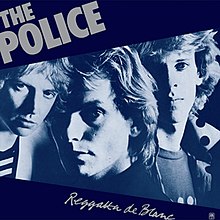Reggatta de Blanc
| Reggatta de Blanc | ||||
|---|---|---|---|---|
 |
||||
| Studio album by The Police | ||||
| Released | 2 October 1979 | |||
| Recorded | 1978 ("No Time This Time"), February – August 1979 | |||
| Studio | Surrey Sound Studios | |||
| Genre | ||||
| Length | 41:52 | |||
| Label | A&M | |||
| Producer |
|
|||
| The Police chronology | ||||
|
||||
| Singles from Reggatta de Blanc | ||||
|
||||
| Professional ratings | |
|---|---|
| Review scores | |
| Source | Rating |
| AllMusic | |
| Chicago Tribune | |
| Christgau's Record Guide | B− |
| Encyclopedia of Popular Music | |
| The Rolling Stone Album Guide | |
Reggatta de Blanc is the second studio album by English rock band The Police, released on 2 October 1979. It features the band's first two UK No. 1 hits: "Message in a Bottle" and "Walking on the Moon". It was their first album to reach No. 1 on the UK Album Charts. In early 1980, the album was re-issued in the US on two 10" discs, one album side per disc, as a collector's edition with a poster of the band.
It was their second album to bear a foreign language title after the band's 1978 debut album Outlandos d'Amour. Reggatta de Blanc proved both more popular and successful than its predecessor. The title track earned the band their first Grammy Award for Best Rock Instrumental Performance in 1980.
In 2012, the album was ranked No. 372 on Rolling Stone magazine's list of the 500 greatest albums of all time.
Reggatta de Blanc took four weeks to record, spaced over several months. Unlike its successor, Zenyatta Mondatta, there was no pressure on the band. Stewart Copeland described it, "We just went into the studio and said, 'Right, who's got the first song?' We hadn't even rehearsed them before we went in." In Modern Drummer magazine, Copeland considers Regatta de Blanc to be the 'best Police record.'
Against the wishes of A&M, who had wanted to equip the promising band with a bigger studio and more famous producer, the Police opted to again record at Surrey Sound with Nigel Gray. The small budget (between £6,000 and £9,000) was easily covered by the profits of their previous album, Outlandos d'Amour, further ensuring that the record label would have no control over the actual creation of the band's music.
...
Wikipedia
